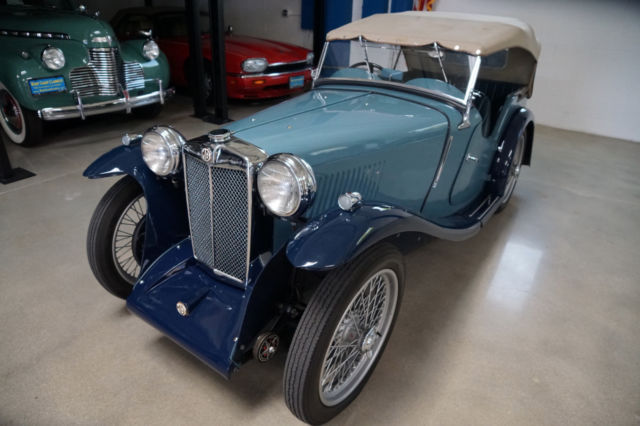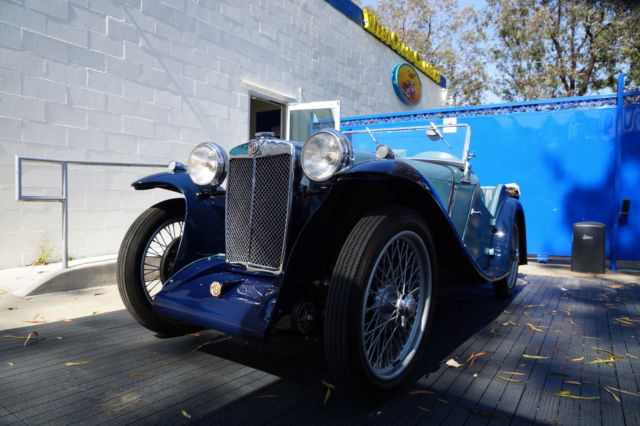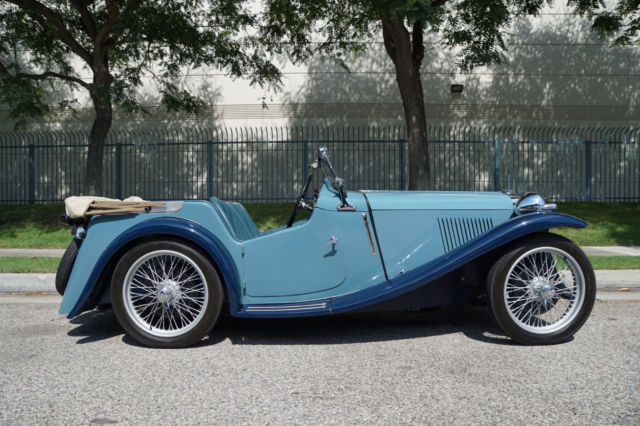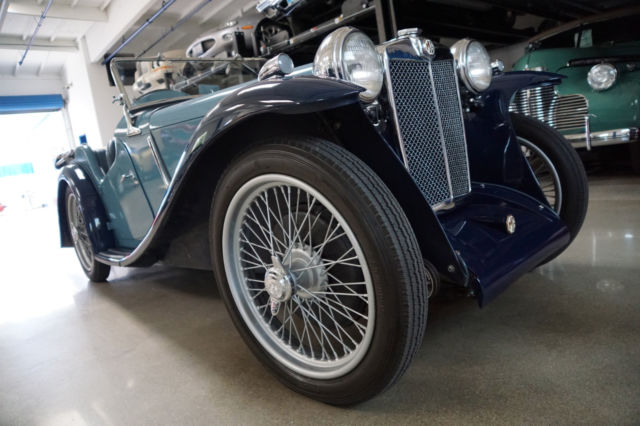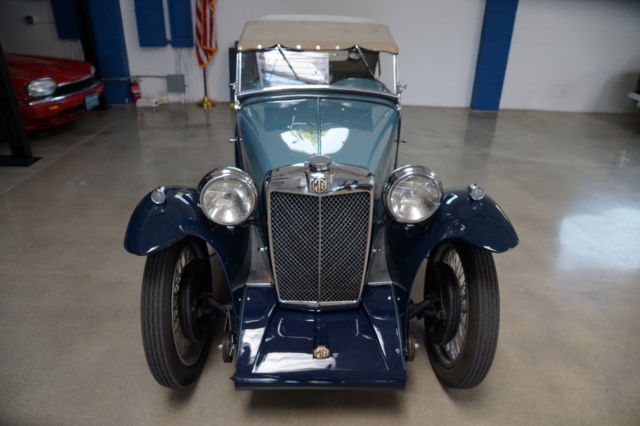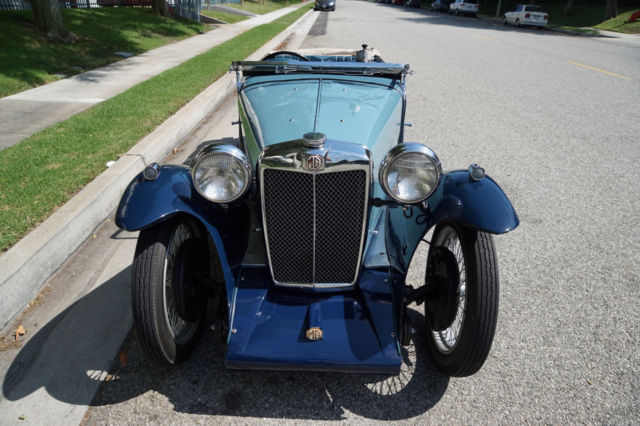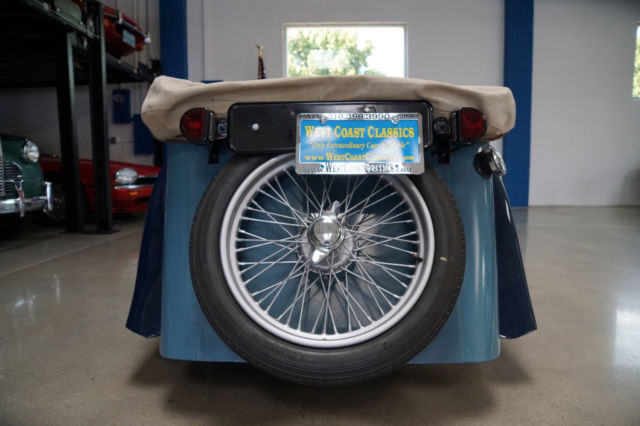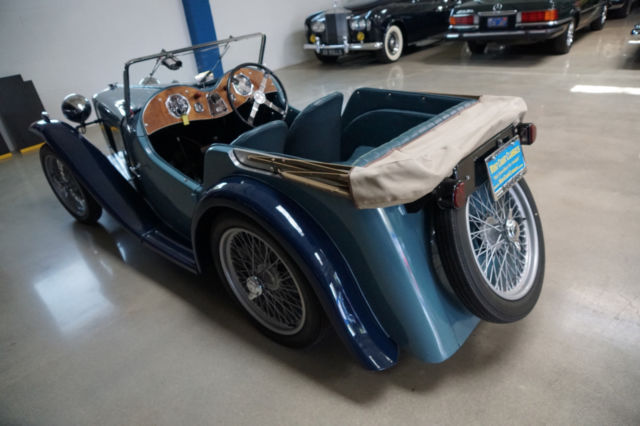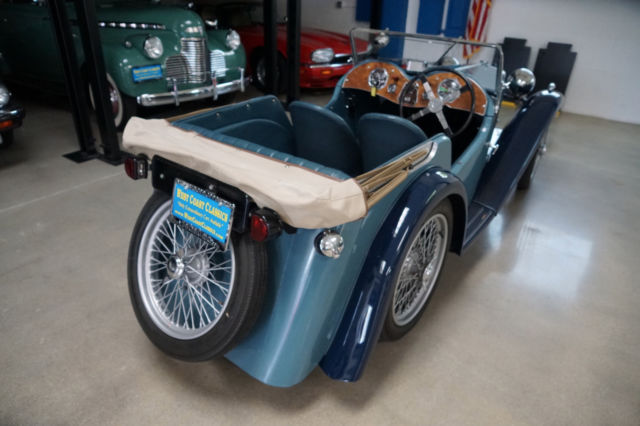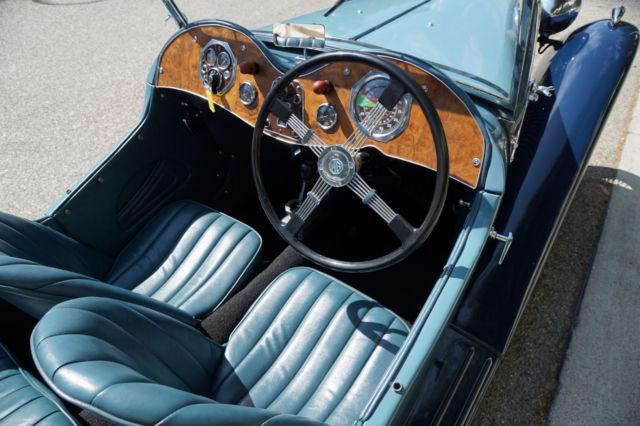1934 MG PA ROADSTER - RARE & DESIRABLE PRE WAR BRITISH SPORTS CAR - MATCHING #'S
Technical specifications of MG PA 1934
| Price: | - |
|---|---|
| Item location: | Torrance, California, United States |
| Make: | MG |
| Model: | PA |
| Type: | Convertible |
| Trim: | ROADSTER WITH MATCHING #'S ENGINE! |
| Year: | 1934 |
| Mileage: | 0 |
| VIN: | PA1438 |
| Color: | Oxford & Cambridge Blue |
| Engine size: | 847 cc 4 cylinder |
| Number of cylinders: | 4 |
| Fuel: | Gasoline |
| Transmission: | Manual |
| Interior color: | Blue |
| Drive side: | Left-hand drive |
| Vehicle Title: | Clear |
| You are interested? | Contact the seller! |
Description
West Coast Classics are proud to present an absolutely exceptional example of this extraordinarily rare 1934 MG PA Roadster with it's original mathcing #'s 847cc 4 cylinder engine, original 4 speed non-synchromesh transmission, and beautifully presented in it's original correct factory 'Oxford Blue over Cambridge Blue' color paint with all body panels obviously removed, stripped and media blasted prior to re-painting, original chrome and light lenses and grille and a gorgeous correct matching blue interior!The car has absolutely no rust and there are no signs or history of any accidents or rust - one very rare example and one of reportedly less than 150 left remaining from a total production build of only 1,973! The car has it's seemingly original tan canvas convertible top and frame with no rips or tears and which is perfectly functional and the car will be sold with it's original tonneau cover (boot), original 'Banjo style' steering wheel, factory spare wheel mounted on the rear, original 'Jaeger' gauges and soon to be banned in 1935 American Sequoia redwood veneer. All the options are working as they should including all the gauges and lights.
The car has been garaged and not run regularly in recent years, the engine starts and the car runs and drives and shifts gear well enough but please note that the car will be needing some engine work to perform correctly as it seems that the compression is weak on one of the cylinders. We have decided to sell the car as is without starting the work ourselves.
The P type Midget was launched in March 1934 as the replacement for the J2 and was produced from (about) March 1934 until the late summer of 1935. 1,973 cars of this type were built and it is reported that no more than 150 MG PA sports cars remain in existence today! It featured an improved overhead camshaft, crossflow 847 cc 4-cylinder engine with twin SU carburetors producing 36 horsepower and it rode on an 87-inch wheelbase chassis with a 4-speed non-synchromesh transmission. However, most of the improvements were in styling and creature comforts. The interior was widened and the instrument panel was in burled sequoia. Trafficators (British for turn signals) and a central lubrication system were included. It is well recognised that the P type had similarities with previous Magnas and Magnettes and its parentage derived from the M and J types. 'Autocar' magazine road tested the P type in November of that year and reported 'This latest model is a marked improvement in all respects over its forerunners'. Sales literature produced by Abingdon claimed, 'In all there are over one hundred new and improved features'. With good reports in the motoring press it was no surprise that the car sold well, with serious production starting at the end of January 1934; over two hundred cars a month were coming off the production lines.
Many MG and pre-war classic sports car enthusiasts consider the MG P- type the purest expression of classic MG styling and the MG PA model is now considered by many to be the quintessential pre-war Midget. When introduced in early 1934, its most important new feature was a three-main- bearing crankshaft. Compared to the previous (two-main-bearing) MG 4-cylinder engines, the P type was fitted with an all new 847cc engine, with three main bearings supporting the rigid crankshaft. This allowed higher engine revolutions to be employed with safety. An improved Tecalemit oil lubrication and filtering system was a welcome addition to the engine. This system had two filters, one externally and the other was a gauze mesh in the sump, both of which ensured thorough filtering of the oil, thus prolonging the life of the crankshaft and cylinder bores. A "smooth flow" cylinder head with inlet ports on one side and exhaust on the other had an overhead camshaft and the new engines were much more robust and also much smoother running.
The transmission was strengthened and improved to withstand the increased engine power output and stresses imposed by competition work and a new design heavy duty clutch was employed to cater for the rigorous stops and starts on sprints and hill climbs. A four speed non-synchromesh gearbox with a low ratio first gear for competition purposes transferred the power to a specially strengthened back axle with a four star differential. Twelve inch diameter brake drums replaced the previously used eight inch variety. This move gave far greater braking efficiency. Hartford friction dampers were fitted to the front of the car and transversally mounted hydraulic spring compensated shock absorbers at the rear gave good suspension and a comfortable ride over most surfaces.
There were other changes too: longer wheelbase, enlarged cockpit, greatly enlarged brake drums. Styling was refined too with the level of standard equipment described in the sales brochure of the time indicated that it was "all the usual equipment that sportsmen demand - supplemented by the following new extras: Easily accessible tool accommodation; non-reflecting fascia board; new revolution counter; chromium plated long range headlamps; new seat adjustment; dual arm electric windscreen wiper; stop and tail lamp; improved hood and side curtains; and new fold flat windscreen with toughened non-discolourable Triplex safety glass."
The first cars produced were all two seaters and following its predecessor the J2 had its wheels painted to match the car's interior, this was soon dropped in favor of aluminum paint. P types were available in three distinctive duo-tone paint schemes, each one came with matching upholstery. Our feature car is painted in Oxford Blue and Cambridge Blue, other options were: Ulster Green and Dublin Green and Carmine Red and Saratoga Red. The most popular single color scheme however was Black, closely followed by Green and then Red followed by Blue. Some cars were produced in primer only to allow the prospective owner to have the car painted to his choice and for an extra ten guineas the owner could specify the factory to complete the car in any color leather or bodywork he so desired.
Most of the design knowledge gained from previous involvement in production car trials and racing proved invaluable to the production of the P type. The chassis was far sturdier than the J type and the body was less angular and had more flowing lines. Two variations were available with either a two or four seater version coming direct from the factory, however a fixed head coupe was offered on the P type chassis by specialist coachbuilders such as H W Allingham of London, University Motors (who were main MG agents) and Cresta Motors of Worthing. The most popular of these conversions was undoubtedly the Airline Coupe by H W Allingham but very few of these attractive cars were produced because they were considered fairly expensive and larger standard cars could be bought for about the same price. When introduced the P type two seater sold for £220 compared to £240 for the four seater version. The Airline Coupe was offered at £290.
The P type was never intended as a racing model, unlike many of its predecessors, however it was seen on the circuits and in 1935 a three car team of P types was entered in the 24 hour Le Mans race. The team was managed by George Eyston and consisted of six ladies affectionately known as "The Dancing Daughters" although they attracted much publicity, they did not fair particularly well against opposition from Singer's 972cc sports car. The Singers took 1st, 3rd and 4th places. This, along with other factors prompted Abingdon to produce a more powerful model, to be designated the PB which was introduced in 1935. The engine capacity was increased to 939cc to give more power and a close ratio gearbox was fitted. Other changes included a slatted grille instead of the honeycomb type, a quick release petrol filler cap was now standard on the two seater versions. The dashboard was to feature a burr walnut fascia to replace the now banned American Sequoia redwood veneer. The rev counter was changed and a speedometer with a mileage trip meter replaced the P type's centre panel. A 30 mph warning light was also introduced at this time. The original P type was discontinued in favor of the new model although it was still catalogued at a substantially reduced price. This move failed to sell the remaining stocks and 27 P types were converted to PB models by the end of 1935. Production of the PB finally ceased in February 1936 with only 525 being produced. A total of 2,500 P types left Abingdon between 1933 and 1936.
The PA proved itself competitive in amateur racing, trials, and hillclimbs. A few P- types competed in high profile events and as previously stated probably most famously by “George Eyston’s Dancing Daughters” who were a six- woman racing team who drove three P-types in the 1935 '24 Hours of Le Mans'. They raised quite a sensation, though they only finished 24th, 25th, and 26th place overall. Approaching Le Mans as an endurance trial rather than a race, the team’s goal was to achieve absolutely consistent lap times – fast, but not so fast that they might break. The MG team achieved an average speed of over 53mph. The three car effort only required exactly one replacement part: a tail lamp bulb!
This is obviously one especially desirable example of the rare MG PA roadster, with a total production of only some 1,973 ever built and with reportedly only maybe 150 still remaining, even fewer can be anywhere close to comparable to this particularly exquisite example. This car truly has to be seen to be appreciated and without a doubt you will look long and hard to find a finer example of this beautifully presented 1934 MG PA Roadster, a very rare piece of British motoring history and obviously absolutely essential for any serious MG collection and quite simply a perfect car for the MG enthusiast or any pre-war classic car collector!
For further information contact West Coast Classics through EBay or on 310-399-3990 during regular California business hours.
WEST COAST CLASSICS, LLC Please note: TERMS OF SALE: YOU BID TO OWN: This vehicle is being sold by West Coast Classics, LLC; we are licensed and bonded vehicle dealers in the state of California. Please note that all vehicles sold to be registered in the state of California will be charged California sales tax on the final EBay sales price and any required government licensing, smog, documentation and registration fees. If leaving the state or country, the vehicle must be picked up by a professional licensed auto transportation company that can provide a bill of lading, otherwise California sales tax will be charged. (All licensed auto transport companies provide these). Any out of the state and international buyers will upon completion of the sale be sent by FEDEX the title and bill of sale for the vehicle and will be personally responsible for any sales tax and licensing and registration fees in their home state or province. All bids are legal and binding contracts to purchase the vehicle and by bidding you are hereby entering into a legal and binding contract to purchase the vehicle and agreeing to accept and abide by these terms of sale: Mechanical inspections welcomed; if you wish to inspect the vehicle you must do so before bidding; upon request seller will be happy to deliver the vehicle to a local Santa Monica mechanic of your choice for your prepaid inspection before the reserve price is met. Once the reserve price is met this vehicle is to be considered sold in ‘as is, where is’ condition to the highest bidder with no guaranties or warranties implied or given. Please have all funds available before bidding as a $1,000 non-refundable deposit is required from the winning bidder within 48 hours (2 business days) of auction end; an immediate $500 non-refundable deposit is required through Ebay’s Paypal service to end the auction early if the "Buy it now" option is exercised and the balance in full is due within ten days of auction end in any case. In the case these terms of sale are not met seller reserves the right to either re-list the vehicle or offer the vehicle to the next highest bidder. Seller reserves the right to end the auction at any time before the reserve price is met. Payment by bank wire transfer, cash in person or cashiers check only. All inspections must be done prior to bidding. The non-refundable deposit in the amount of $1,000 is due within 48 hours of the auction end via bank wire transfer or cashier's check via overnight mail. The full payment must be completed within 10 days regardless of a pick up date. In the event the deposit is not posted within the required period of time, the vehicle will be offered for sale to the next subsequent high bidder or relisted for sale. This is to be considered an absolute sale and the buyer is required to comply with all of my conditions in these terms of sale. By placing a bid and winning the auction you hereby agree to abide completely with these terms of sale and the terms of sale are to be considered a legal and binding purchase agreement. Once again, please note that there are no inspections to be made after the auction ends - please be sure to complete any inspection before bidding. The Seller reserves the right to cancel any bid at any time and to end the auction early for any reason. The seller makes every effort to describe in detail any known flaws in the vehicle and includes many detailed and recent photos of the vehicle. The mileage on the vehicle is correct at the time of listing but obviously subject to minor changes necessary to complete delivery of the vehicle to the buyer and test drives etc. Please note that all used vehicles, especially classic and older vehicles, are by definition unique and complex and their condition, for better or worse, must always be considered a subjective opinion to each individual. Therefore the seller shall not be responsible for the absolute correct description, authenticity, genuineness, or defects herein, and makes no guaranties or warranty in connection therewith. Vehicles are sold with one master key unless otherwise stated. Vehicles are sold with handbooks and manuals only if stated in the advertisement. Buyer hereby acknowledges that any definition or terms relating to a "matching numbers" description of any car has been met and the buyer has inspected the car and is satisfied with the description prior to bidding or purchase. No allowance will be made on account of any incorrectness, imperfection, defect or damage. Any descriptions or representations are for identification purposes only and are not to be construed as a warranty of any type. It is the responsibility of the buyer to have thoroughly inspected the vehicle, and to have satisfied himself or herself as to the condition and value of the vehicle before bidding and to bid based upon that judgment solely. Seller assumes no responsibility for any repairs whatsoever regardless of any oral or written statements about the vehicle. A documentation fee of $65, which is capped and regulated in California as opposed to some other states, is charged on each sale, which once established legally has to be charged equally on each sale, to cover any necessary costs related to FEDEX mailings and other professional documentation paperwork fees for processing documents to establish title and registration in order to complete the transfer of documents to the new registered owner. Good luck and thanks for your interest!
